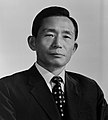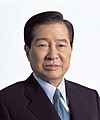 |
환영합니다! / Welcome To The South Korea Portal!  South Korea, officially the Republic of Korea (ROK), is a country in East Asia. It constitutes the southern part of the Korean Peninsula and borders North Korea along the Korean Demilitarized Zone; though it also claims the land border with China and Russia. The country's western border is formed by the Yellow Sea, while its eastern border is defined by the Sea of Japan. South Korea claims to be the sole legitimate government of the entire peninsula and adjacent islands. It has a population of 51.96 million, of which roughly half live in the Seoul Capital Area, the ninth most populous metropolitan area in the world. Other major cities include Incheon, Busan, and Daegu. The Korean Peninsula was inhabited as early as the Lower Paleolithic period. Its first kingdom was noted in Chinese records in the early 7th century BCE. Following the unification of the Three Kingdoms of Korea into Silla and Balhae in the late 7th century, Korea was ruled by the Goryeo dynasty (918–1392) and the Joseon dynasty (1392–1897). The succeeding Korean Empire (1897–1910) was annexed in 1910 into the Empire of Japan. Japanese rule ended following Japan's surrender in World War II, after which Korea was divided into two zones: a northern zone occupied by the Soviet Union, and a southern zone occupied by the United States. After negotiations on reunification failed, the southern zone became the Republic of Korea in August 1948, while the northern zone became the communist Democratic People's Republic of Korea the following month. In 1950, a North Korean invasion began the Korean War, which ended in 1953 after extensive fighting involving the American-led United Nations Command and the People's Volunteer Army from China with Soviet assistance. The war left 3 million Koreans dead and the economy in ruins. The authoritarian First Republic of Korea led by Syngman Rhee was overthrown in the April Revolution of 1960. However, the Second Republic was incompetent as it could not control the revolutionary fervor. The May 16 coup of 1961 led by Park Chung Hee put an end to the Second Republic, signaling the start of the Third Republic in 1963. South Korea's devastated economy began to soar under Park's leadership, recording the one of fastest rises in average GDP per capita. Despite lacking natural resources, the nation rapidly developed to become one of the Four Asian Tigers based on international trade and economic globalization, integrating itself within the world economy with export-oriented industrialization. The Fourth Republic was established after the October Restoration of 1972, in which Park wielded absolute power. The Yushin Constitution declared that the president could suspend basic human rights and appoint a third of the parliament. Suppression of the opposition and human rights abuse by the government became more severe in this period. Even after Park's assassination in 1979, the authoritarian rule continued in the Fifth Republic led by Chun Doo-hwan, which violently seized power by two coups and brutally suppressing the Gwangju Uprising. The June Democratic Struggle of 1987 ended authoritarian rule, forming the current Sixth Republic. The country is now considered among the most advanced democracies in Continental and East Asia. (Full article...) Selected article -Seoul, officially Seoul Special City, is the capital of the Republic of Korea (ROK), commonly known as South Korea, and the country's most extensive urban center. The broader Seoul Capital Area, encompassing Gyeonggi province and Incheon metropolitan city, emerged as the world's fourth largest metropolitan economy in 2014, trailing only Tokyo, New York City, and Los Angeles, hosting more than half of South Korea's population. Although Seoul's population peaked at slightly over 10 million, it has gradually decreased since 2014, standing at approximately 9.97 million residents as of 2020. Seoul is the seat of the South Korean government. Seoul's history traces back to 18 BC when it was founded by the people of Baekje, one of the Three Kingdoms of Korea. During the Joseon dynasty, Seoul was officially designated as the capital, surrounded by the Fortress Wall of Seoul. In the early 20th century, Seoul was occupied by the Japanese Empire, temporarily renamed "Gyeongseong." The Korean War brought fierce battles, with Seoul changing hands four times and leaving the city mostly in ruins. Nevertheless, the city has since undergone significant reconstruction and rapid urbanization. Seoul was rated Asia's most livable city, with the second-highest quality of life globally according to Arcadis in 2015 and a GDP per capita (PPP) of approximately $40,000. 15 Fortune Global 500 companies, including industry giants such as Samsung, LG, and Hyundai, are headquartered in the Seoul Capital Area, which has major technology hubs, such as Gangnam and Digital Media City. Seoul is ranked seventh in the Global Power City Index and the Global Financial Centres Index, and is one of the five leading hosts of global conferences. The city has also hosted major events such as the 1986 Asian Games, the 1988 Summer Olympics, and the 2010 G20 Seoul summit. (Full article...)Selected image The 2010 G-20 Seoul summit was the fifth meeting of the G-20 heads of government to discuss the global financial system and the world economy. It was held in Seoul, South Korea. More did you know -
In the news
This is a Good article, an article that meets a core set of high editorial standards.  The 2010 Korean Grand Prix (formally the 2010 Formula 1 Korean Grand Prix) was a Formula One motor race held on 24 October 2010 at the Korea International Circuit in Yeongam, South Jeolla, South Korea. It was the seventeenth round of the 2010 Formula One World Championship and the first Korean Grand Prix. Ferrari driver Fernando Alonso won the 55-lap race starting from third position. Lewis Hamilton finished second for McLaren and Alonso's teammate Felipe Massa was third. The race began behind the safety car but was stopped after three laps because of a large amount of standing water on the circuit. After a 45-minute delay, the race was restarted and the safety car was withdrawn after thirteen laps. Pole sitter Sebastian Vettel maintained his lead going into the first corner. A second safety car deployment caused by the collision of Mark Webber and Nico Rosberg on lap nineteen closed up the field but Vettel retained the lead. Alonso maintained second position until a botched pit stop during a third safety-car period caused him to drop to third. At the restart on lap thirty-five, Hamilton ran wide at the first corner, allowing Alonso back into second place. Vettel's engine failed eleven laps later, promoting Alonso to the lead, which he maintained to win the race. The victory was Alonso's fifth of the season; the result elevated him to the lead of the Drivers' Championship, eleven points ahead of Webber, who had dropped to second after failing to finish the race. Hamilton moved into third and Vettel's retirement demoted him to fourth. Jenson Button remained in fifth position. In the World Constructors' Championship, McLaren reduced the points deficit to Red Bull to twenty-seven points behind. With two races of the season remaining, Ferrari was a further twenty-five points adrift. (Full article...)General images -The following are images from various South Korea-related articles on Wikipedia. Did you know (auto-generated)
WikiProjectsSee WikiProject Korea for collaborating on South Korea topics, and more broadly, on all things Korea-related. South Korea topics CategoriesAdministrative divisions of South Korea Related portalsEast Asia Associated WikimediaThe following Wikimedia Foundation sister projects provide more on this subject:
Web resources
SourcesDiscover Wikipedia using portals |























































